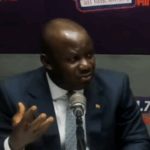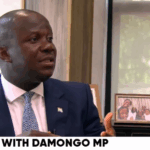
Economic policy analyst and entrepreneur, Senyo Hosi, has praised the Mahama government for demonstrating fiscal prudence and restoring macroeconomic stability since assuming office in January.
He, however, cautioned that much more remains to be done to make the country’s economic recovery sustainable and inclusive.
Speaking at the 2025 Deloitte Economic Dialogue on the 2026 Budget, Mr Hosi described the budget as a “great one” that reflects discipline and progress, while also warning that Ghana has yet to achieve meaningful transformation.
“Please, people at the Ministry of Finance today have done a great job. They deserve a round of applause,” he said. “We’ve seen [this] before; [but the next day we were in] chaos. The real question is whether we can actually sustain it or not. That’s why we must remain vigilant.”
According to him, the government’s recent performance on revenue, expenditure, and primary balance targets reflected “fiscal prudence and deliberate progress.”
He noted that the 2025 budget had projected revenue of GH¢211 billion, but outturns were higher at GH¢226 billion, while expenditure was contained below forecasts.
Mr Hosi, who is also a multi-sector entrepreneur with interests in agriculture, finance, technology, and manufacturing, however, stressed that the 2026 budget “is not a transformational budget.”
“At the top level, I agree it’s a great budget, but it’s not transformational,” he argued. “There’s brilliance in this budget, especially when you look at the plan for capital expenditure.
“It’s supposed to really drive growth. I think it’s fantastic. But the question is whether that infrastructure is going to stimulate sustainable growth or not.”
He commended the government’s decision to restructure mineral royalties and avoid the controversial Agyapa deal, saying:
“If we hadn’t fought Agyapa, we’d be losing a billion dollars every year today. The people responsible this time deserve credit.”
Nonetheless, Mr Hosi cautioned that while the macroeconomic fundamentals are improving, inequality, food insecurity, and unemployment remain deep-rooted challenges.
“Every single budget I’ve read in the last five years keeps talking about job creation. Yet we don’t even give data on unemployment,” he said.
“Underemployment is higher than official figures suggest. IMF and census data show youth underemployment at 50 per cent. Poverty has barely changed. Food insecurity is worse. 15 million people are food insecure, up from 11 million in 2016.”
On agriculture, he lamented that the sector employs over 38% of the workforce but contributes only 21% to GDP, describing it as “structurally weak and underproductive.”
“We keep talking fertiliser and seeds, but where’s the plan for actual production output? The Big Push is fantastic. But why not put GH¢2 billion of that into unlocking agriculture? That’s how you create real transformation,” he said.
Mr Hosi also downplayed the government’s much-touted “24-hour economy” initiative as a slogan that should instead be an outcome of solid policy implementation.
“You don’t declare a 24-hour economy. You create conditions for it,” he stressed. “If I’m a rice producer, I’ll run three shifts when demand and raw material supply are there. What levers are being unlocked to make that happen?”
Despite his concerns, Mr Hosi endorsed some of the government’s reforms, including the Gold Board’s traceability policy to track small-scale mining activities.
“The Gold Board policy is possibly the most significant economic policy taken in the last 10 years,” he said.
“Tracking and tracing gold transactions will cut leakages and enforce responsible sourcing. It’s feasible, and I strongly support it.”
He concluded by urging government and the private sector to prioritise research, industrialisation, and transparency as key pillars of long-term growth.
“First, stop corruption. Businessmen are part of it,” he said. “Next, do proper research to unlock industries. If we unlock industries, the youth will be employed. Beyond applause and slogans, we must make Ghana productive again; research-driven, transparent, and fair.”
The Deloitte Economic Dialogue brings together policymakers, academics, and industry leaders to analyse Ghana’s annual budget and its implications for growth and fiscal management.
The 2025 edition focused on the theme “Resetting Growth, Jobs, and Economic Transformation” following Ghana’s efforts to stabilise the economy under an IMF-supported program.


